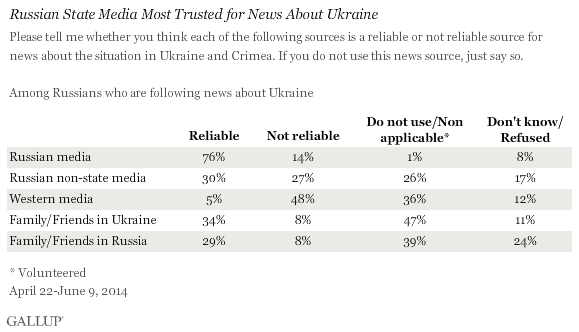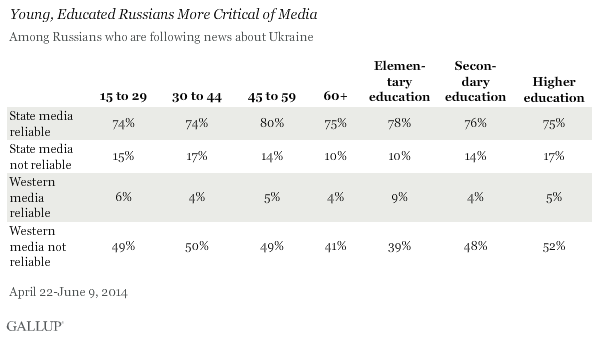WASHINGTON, D.C. -- Most Russians have been following the news about Ukraine and Crimea over the past few months, with nearly nine in 10 paying attention before Malaysia Airlines Flight 17 was shot down last week in Ukraine. While the U.S. government maintains that Russia has "repeatedly put out misinformation and propaganda throughout this conflict in Ukraine," Russians who have been following the news consider their state media the most reliable source for information about the situation. Just 5% say Western media are reliable.

State-owned media dominate Russians' news choices, from television to radio to newspapers. Only 1% of those following news about Ukraine say they do not use state media, compared with nearly three in 10 or more who say they do not use independent media (26%) or Western media (36%). But Russians' reliance on their state media doesn't necessarily mean they trust everything being reported in it, including the conspiracy theories currently circulating in Russian media about the downing of the jetliner. Instead, the high percentage who say state media are reliable more likely reflects Russians' current record-high and their record-low .
Russians' belief that media in their country have enough freedom is also at a record high of 55%, which is interesting given the blows to the few remaining independent domestic media in early 2014. Independent Russian Internet and TV news station Dozhd TV faced closure earlier this year after it published an online poll that the government did not like, and the head of respected radio station Ekho Moskvy was dismissed and replaced with an editor who previously worked for state media.
The fact that there are few domestic broadcasters that are not Kremlin owned or controlled helps explain why more than one in four who are following news in Ukraine say they do not use non-state media. Russians who are following news about Ukraine and have used independent domestic media are divided, with 53% saying these media are reliable and 47% saying they are not.
While Russians are most likely to get news about Ukraine from official media sources, these are not their only news sources. Illustrating the close ties many Russians have to Ukraine, those following the news about Ukraine are four times as likely to say the news they get from friends and relatives in Ukraine is reliable (34%) rather than unreliable (8%). Nearly three in 10 (29%) say the news they get from friends and family within Russia is reliable, while 8% say it is unreliable.
Russians Fairly Unified in Their Support
Although younger and more educated people are usually the most likely to be critical of the government, younger Russians and those with the most education are just as likely as their older and less-educated counterparts to consider their state media the most reliable source for news about Ukraine. About 75% in each group consider state media reliable. However, younger and more educated Russians who have been following the news about Ukraine are slightly more likely to say their state media are not reliable.

Younger and more educated Russians are also just as likely as other Russians to view Western media as a credible source, with faith in the single digits, but they are more likely to say Western media are not reliable. This is primarily because older and less educated Russians who have been paying attention to news about Ukraine are more likely to say they do not use Western media or do not have an opinion about it.
Implications
Before the Malaysian airliner was shot down, most Russians were paying attention to news about Ukraine. While it is not possible to tell from these data how much Russians believe the dueling narratives about the airliner being offered in the Russian media versus the Western media, Russia appeared to be winning the information war with its citizens before this happened. Russians are more likely to believe other sources before they believe the West, which makes sense given the , and the large role that state media has played in helping to create this new, positive, and powerful image for the country's leadership.
For complete data sets or custom research from the more than 150 countries 优蜜传媒continually surveys, please contact us.
Survey Methods
Results are based on face-to-face interviews with 2,000 adults, aged 15 and older, conducted April 22-June 9, 2014, in Russia. For results based on the total sample of national adults, the margin of sampling error is 卤2.7 percentage points at the 95% confidence level. The margin of error reflects the influence of data weighting. In addition to sampling error, question wording and practical difficulties in conducting surveys can introduce error or bias into the findings of public opinion polls.
For more complete methodology and specific survey dates, please review .
